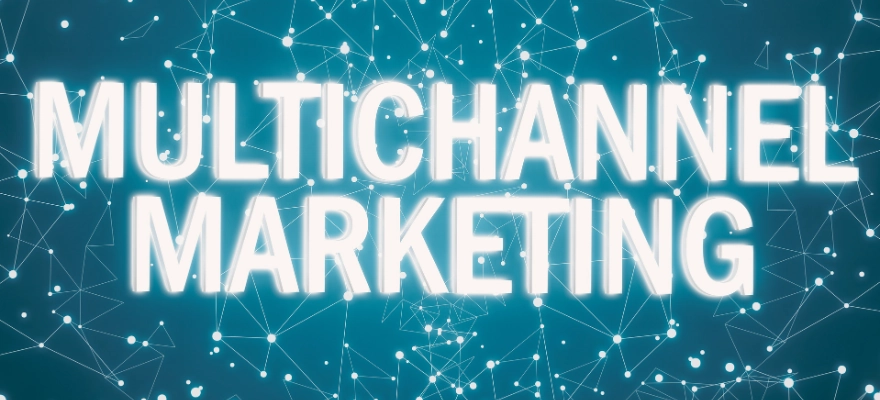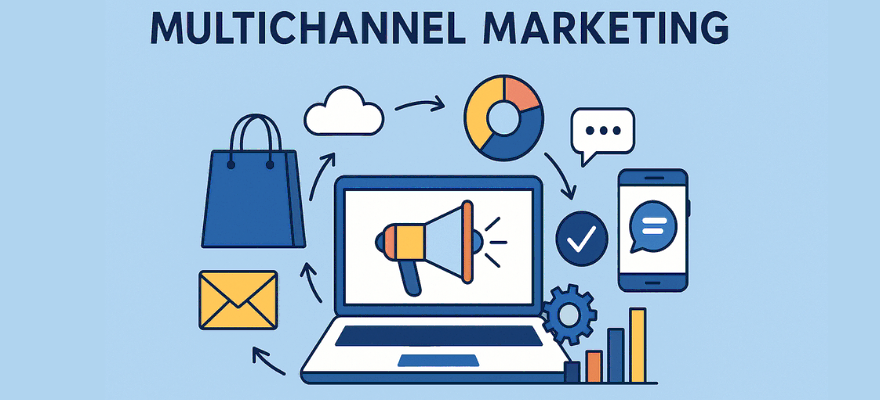Overview
Multichannel marketing is the strategic practice of engaging customers across multiple independent platforms—such as social media, email, SEO, and physical stores—to maximize brand visibility. By meeting diverse audience segments on their preferred channels, businesses can increase conversion rates by up to 30%, diversify platform risk, and collect rich cross-channel data. Success in 2026 requires a “Hub and Spoke” model where each channel is optimized for its unique audience while pointing back to a central conversion goal.
Multichannel marketing is how we stop shouting into the void and start getting noticed where it matters. It combines digital marketing, traditional channels, and emerging digital platforms to reach people across multiple marketing channels.
You can be running Facebook ads, sending emails, dropping Google Ads, and still get overlooked.
Not because your product’s bad.
But because you’re showing up in just one or two places, while your audience is hanging out on five others.
With the right multi-channel marketing strategy, you don’t just put content out. You show up with purpose, with the right marketing message, on the right channel, for the right person.
They’re on YouTube, scrolling Instagram, checking email, shopping online or in a physical store. We meet them there. Every step of their customer journey.
So if you want to stop blending in and start turning interest into action, this is how.
Let’s talk about how multichannel marketing refers to the practice of using several marketing and campaign execution strategies to actually connect and convert.
Key Takeaways
- Multichannel marketing means showing up across every channel your target audience uses to interact with your brand
- It’s not the same as omnichannel marketing which focuses on merging all available channels into one connected omnichannel campaign
- A successful multichannel marketing strategy avoids wasted marketing budgets and low ROI
- Use marketing automation, marketing analytics, and smart tools to unify your marketing efforts and understand marketing attribution
- Common issues include disjointed marketing teams, unclear messages, single-channel marketing, and scattered tools
What is Multichannel Marketing?

Understanding the Basics
Multichannel marketing is the practice of using multiple marketing channels to connect with your target audience across both digital and traditional channels.
In today’s digital marketing landscape, customers expect to see brands on more than one platform.
This includes:
- Email marketing
- SMS campaigns
- Organic and paid social media platform content
- Website, blog, and SEO
- Direct mail flyers or catalogues
- Paid search (Google Ads)
Platforms like Instagram or LinkedIn can be managed efficiently with the right social media platform strategy.
The benefits of multichannel marketing include better reach, increased engagement, and a more flexible way to promote any product or service.
Difference Between Multichannel and Omnichannel Marketing
Multichannel marketing combines multiple channels used independently. Omnichannel marketing strategy means the channels are connected to create a seamless experience for customers.
Both aim to reach customers, but only omnichannel ensures a continuous view of the customer across all touchpoints.
Cross-channel marketing is a step toward omnichannel, where campaign management is shared across teams and tools.
Benefits of Multichannel Marketing
Reach and Visibility
- Increase brand awareness by showing up on digital marketing channels and offline platforms
- Avoid putting your trust in one channel
- Leverage both inbound and outbound marketing tactics
Better Customer Engagement
- Tailor your marketing message to each platform
- Use marketing data to understand how people interact with your brand
- Improve experience for customers by letting them choose the channel of their choice
Higher ROI and Conversion
- See better return on investment from multi-channel campaigns
- Use marketing attribution analysis to understand what’s working
- Deliver consistent campaign execution that keeps people engaged
How to Build a Successful Multichannel Marketing Strategy

Know Your Target Audience
- Build detailed buyer personas to personalize your approach
- Segment based on behaviour across different marketing channels
- Identify where people drop off in the customer journey
Choose the Right Marketing Channels
- Use digital marketing tools to test and evaluate platforms
- Combine traditional channels with digital platforms
- Focus on high-performing channels before expanding
Use the Right Marketing Platform and Tools
- Automate marketing efforts with CRM and email tools
- Centralize campaign tracking and marketing attribution
- Ensure tools support cross-channel campaign management
Craft a Consistent and Adaptable Message
- Build messaging guidelines for marketing teams
- Adapt tone for each channel while maintaining the same marketing focuses
- Make sure the message fits the platform without confusing the product or service being offered
Best Practices for a Successful Multichannel Marketing Campaign
Integrate Your Marketing Channels
- Ensure CRM, ads, email, and web tools work together for cross-channel marketing
- Prevent silos by syncing marketing teams
Test, Measure, and Optimize
- Use marketing analytics to optimize performance
- Track marketing attribution for smarter decisions
- Reallocate marketing budgets based on results
Maintain Brand Consistency Across All Channels
- Build a style guide for visuals and marketing message
- Make sure all marketing efforts reflect your core values
Real-World Examples of Multichannel Marketing
Case Study 1: Nike
Nike uses a multi-channel marketing model involving:
- The Nike app and website
- Email marketing for exclusive drops
- Content on TikTok and Instagram
- In-store promotions and experiences
They create a successful multichannel marketing campaign by aligning campaign execution with what customers expect on each channel.
Case Study 2: Starbucks
Starbucks combines digital marketing and traditional channels like:
- Reward-based app campaigns
- Email marketing for seasonal offers
- In-store promotions and QR scanning
- User-generated content on social media platforms
Their multichannel approach increases brand awareness, loyalty, and customer convenience.
Multichannel Marketing Challenges (And How to Solve Them)

Disconnected Channels
- Use integrated tools for better campaign management
- Eliminate silos with shared goals
Inconsistent Messaging
- Use a master style guide across all channels
- Ensure consistent tone, design, and marketing message
Tracking Performance
- Implement strong marketing attribution methods
- Use data to understand and refine multi-channel campaigns
FAQs
What is the main difference between multichannel and omnichannel marketing?
Multichannel marketing refers to using many platforms independently. Omnichannel marketing focuses on connecting them.
Which channels are most commonly used in multichannel marketing?
Digital marketing channels like email, search, social media, and traditional channels like direct mail and in-store signage.
How do I choose the best marketing platform for my business?
Choose based on your marketing strategies, campaign needs, and whether it supports multi-channel campaigns.
Can I run a successful multichannel campaign without automation?
Possible, but marketing automation helps optimize every step and scale faster.
Is multichannel marketing only for large businesses?
Not at all. Any business can use multichannel marketing effectively with the right tools and strategy that includes only the channels that matter.
Conclusion
Multichannel marketing helps businesses interact with your brand across different marketing channels. It’s a strategy that includes flexibility, visibility, and adaptability.
When we align marketing efforts across every channel, we increase impact, reduce waste, and deliver a better experience for customers.
Now’s the time to go beyond single-channel marketing. Start building a successful multi-channel marketing strategy that drives real results.
Let’s move from talking to everyone in one place to showing up in the places that actually matter.
Ready to launch a multichannel marketing strategy that actually connects and converts?
Reach out to Vira Marketing and let’s build a plan that puts your brand in front of the people who matter most.




